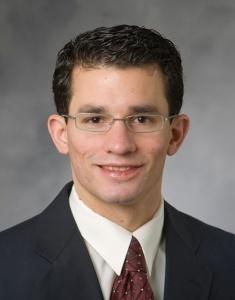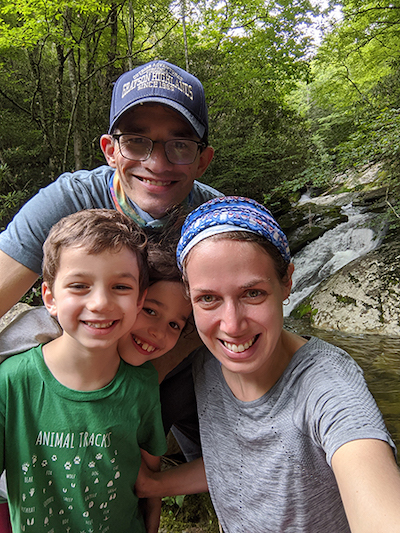
This week's Faculty Spotlight shines on Brian H. Eichner, MD, an assistant professor of pediatrics in the Division of Primary Care. Eichner talks to us about his research in primary care as well as his involvement in resident and student education, continuing education, and advocacy in the area of gun violence prevention. Notably, he has most recently become involved in a partnership aiming to improve school outcomes in Latinx patients with ADHD. In this interview, Eichner also discusses his perceptions of the greatest challenges and opportunities in the field of primary care today as well as his most significant mentor—Dr. Jeff Baker.
How long have you been at Duke? How did you decide to come here?
I’ve been at Duke since 2006, when I came here for residency. I loved the area (especially coming from Buffalo, where I attended medical school, after having previously attended Duke for undergad). I initially came here planning to pursue a fellowship in pediatric hematology-oncology, but instead, I fell in love with primary care and took a faculty position when I graduated in 2009.
What are your current responsibilities within the Department of Pediatrics? What does your typical day look like?
As a “generalist”, I get to take care of every type of pediatric medical condition, and I apply that term to the other things I do as well. I have a once-weekly Diagnostic Clinic, I am involved in primary care research, resident and student education, continuing education for our Division, and advocacy in the area of gun violence prevention. My main focus, however, is clinical, and I enjoy taking care of a really amazing group of patients, ranging from healthy to medically complex.
How and when did you initially become interested in medicine? What made you decide to pursue a career in pediatrics in particular ?
I never had an “aha!” moment to enter medicine but I always was fascinated by the unique way that you can help people as a physician. More generally, I have always been interested in science and teaching (I also considered tropical ecology and teaching as careers) and a career in academic pediatrics allows me to stay involved with both. Academics aside, a large part of pediatric primary care practice is teaching families and patients about their health. Additionally, working with children is so much fun because you NEVER know what they are going to say!
What do you see as the biggest current challenges and opportunities in the field of primary care pediatrics?
I think we need to grow along with our patients and communities and provide them with what they need, not just what we were trained to do in residency. In just the past two decades, we have seen so much change. We went from not even having EMR’s (and writing notes with my illegible handwriting) to now seeing the opportunities that telehealth provides. We have moved on largely from the treatment of what are now vaccine-preventable diseases to treatment and prevention of obesity and are just now coming to terms with the humbling reality that the grand majority of determinants of children’s health (and subsequent adult health) occur outside the walls of our clinics. As pediatricians, we are tasked with advocating on behalf of our most vulnerable patients and families on individual levels and also within their communities and schools. As primary care pediatricians, we owe it to our patients to improve our care of children with mental health diagnoses and, as technology has advanced, there is a need for us to become more adept at taking care of children with complex health care needs. To accomplish all of this, we may need to look at streamlining well-child care in ways that are more creative and efficient, such as group visits.
Is there any research or other special projects you are doing or plan on doing?
I am fortunate to be involved in some really neat projects with awesome collaborators. I am part of an interdisciplinary colloquium involved in gun violence prevention. I am also involved in research projects studying early autism diagnosis and eczema prevention. Most recently, I have become involved in a partnership aiming to improve school outcomes in Latinx patients with ADHD.
What do you enjoy most about your work?
I love my patients and their incredible families that put their trust in me and are patient with me even when I tell them “I don’t know”. I love that I generally learn something new every day. And I really love knowing that my colleagues in my Division and my teammates at Brier Creek can count on each other through anything--even a pandemic, apparently.

Who was your most significant mentor and what knowledge did you gain through this collaboration?
While I am grateful to so many of my mentors and colleagues, Dr. Jeff Baker has been the most impactful. In addition to sharing direct patient care “pearls” with me, he has, more importantly, taught me HOW to be a physician-how to be there for patients even when there aren’t fixable problems and the value of listening to what families say and how they say it. I always appreciate his words of encouragement and his wisdom and perspective during tumultuous times.
You completed your residency at Duke--do you have any advice for trainees?
1) Beware of second-year syndrome. If you don’t know what that is, ask me!
2) We have amazing patients here--they are our best teachers.
3) Don’t overthink your career choice nor choose the career path that other people tell you that you should choose. Instead, follow your interests and pay attention to what makes you feel excited to be at work.
What passions or hobbies do you have outside of Duke?
I enjoy hiking and trips to the mountains with my wife, Melissa, and our two kids (Becca, 8, and Jordan, 6). During the pandemic, we have explored most of the Falls Lake and Eno River sections of the Mountains-to-Sea Trail. This past summer, we took an amazing trip to the NC mountains and we even completed the challenging Profile Trail at Grandfather Mountain. I also enjoy reading spy and mystery novels and playing soccer (which is on hold right now).